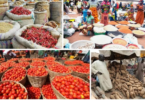On 13th July, 2023 the administration of President Bola Tinubu which was barely two months old announced a state of emergency on food security and declared that matters about food and water availability be under the purview of the National Security Council.
The state of emergency declaration on food security then follows concerns by the President over the escalating prices of food items in the market following the removal of fuel subsidy.
According to the National Bureau of Statistics (NBS), food inflation in July 2023 stood at 26.98%– an increase of 1.73% from the figure recorded in the previous month of June 2023.
However, 12 months after, food inflation has risen by 13.89% from 26.98% recorded in July 2023 to 40.87% in June 2024.
The rise in food inflation is mostly propelled by the increase in staple food prices such as rice, beans, eggs and grains. In the past one year, prices of food items have doubled with some reaching as much as 160% during the period. The price of rice, eggs, beans, fish, garri, yam, sweet potato, plantain, maize and others have seen an over 100% increase year-on-year according to the NBS.
While declaring the state of emergency on food security, the then Special Adviser to the President on Information and Strategy, Dele Alake noted that the administration plans to create a national commodities exchange board, maintain strategic reserve to ensure a steady food supply and deploy savings from fuel subsidy removal to fund agriculture.
He said, “We shall create and support a national commodities exchange board that will review food prices as well as maintain strategic food reserve that will be used as a price stabilisation mechanism for critical grains and food items.”
“In furtherance of this, the federal government would engage security architecture to protect the farms and the farmers so that farmers can return to the farmlands without fear of attacks.”
“The Central Bank will continue to play a major role in funding the agricultural value chain.”
It is important to note that the Presidency mentioned that the Central Bank of Nigeria (CBN) will play a major role in funding the agricultural value chain in the country. However, the CBN under the leadership of Governor Yemi Cardoso has deviated from intervention financing and focused on orthodox monetary policy stating that the apex bank does not have the capacity for it.
Speaking on the failure of the food security emergency declaration to stem the tide of rising food inflation, the President of Community Allied Farmers Association of Nigeria (COMAFAN), Dr. Austine Maduka said efforts by the President on food inflation have not yielded results.
He said, “While the Presidency has made some commitment to food security, the actions taken so far have not yielded significant results. Food insecurity remains a pressing issue in Nigeria, and more needs to be done to address the root causes.”
He explained that the promotion of local food production and processing coupled with policies to reduce reliance on food imports and tackle the problem of transportation will help in stabilising food prices.
The recent food importation policy by the federal government to reduce food inflation has been met with criticism from farmers and policymakers alike. Dr. Maduka said farmers are opposed to the policy because it undermines their effort to produce food locally.
Nothing has been heard from the Presidency on the planned creation of commodities exchange boards but the Minister of Information, Muhammed Idris yesterday stated that the federal government will be distributing 20 trucks of rice to each of the 36 states and the FCT which will be shared to the most vulnerable citizens.
One year after the declaration of emergency on food security, food prices have shown no signs of abating as there has been a renewed increase in prices of staples such as tomatoes, eggs, beans and maize in the past two months. This has pushed the President to walk back on his talk of local food production to imports albeit temporarily.







